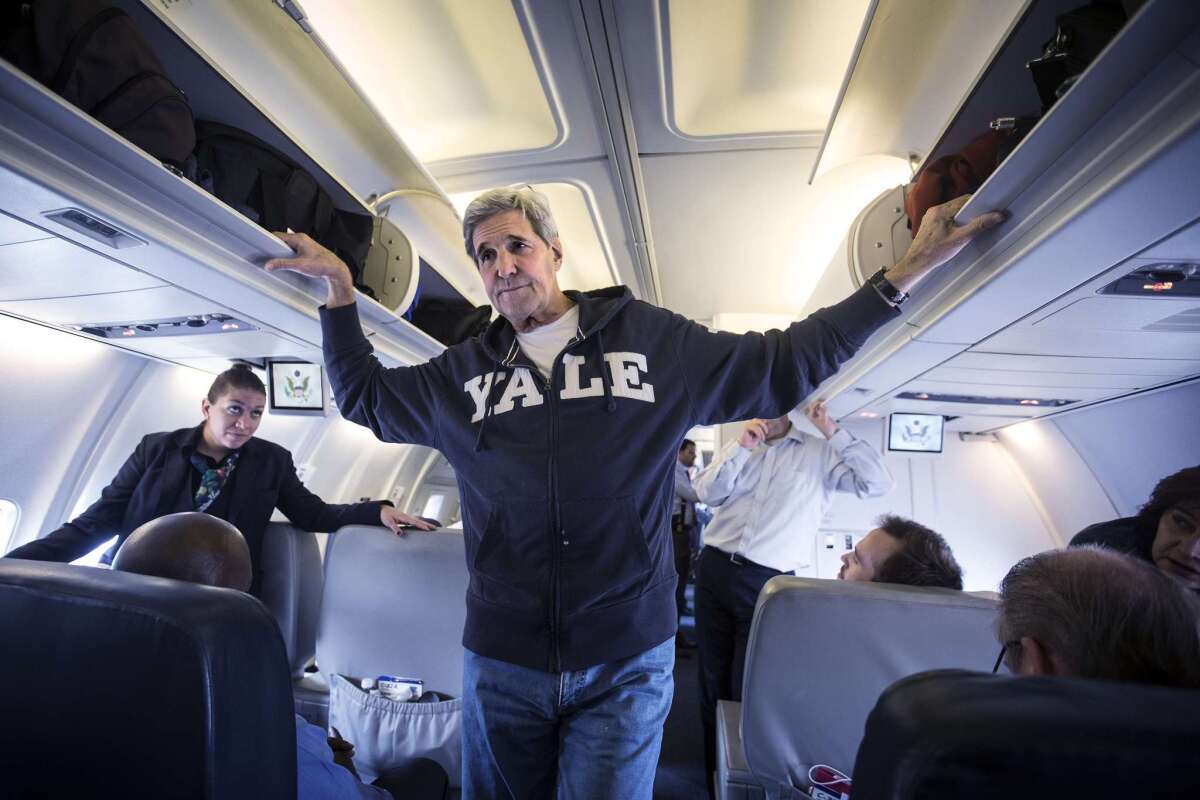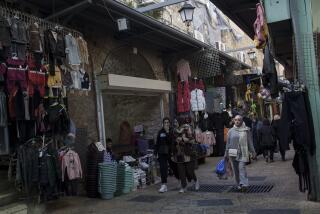Kerry’s mosque-cam idea -- breakthrough or ‘trap’?

Secretary of State John F. Kerry speaks to the media aboard his plane Sunday before heading back to the United States after a Mideast trip.
- Share via
Reporting from Ramallah, West Bank — Secretary of State John F. Kerry’s effort to defuse a month of tension and violence between Palestinians and Israelis over the Al Aqsa mosque compound in Jerusalem has triggered yet more contention over the site.
After meeting Jordan’s King Abdullah II and Palestinian Authority President Mahmoud Abbas in Amman, Jordan, on Saturday, Kerry said the monarch had made “an excellent suggestion” for installing security cameras to monitor activity in the disputed compound.
“This will provide comprehensive visibility and transparency and that could really be a game changer in discouraging anybody from disturbing the sanctity of the holy site,” he said.
Many Palestinians, however, were not enthusiastic about the security camera idea, a move that Israeli police have sought for years. “It is an additional trap to arrest Palestinians on charges of incitement,” Palestinian Authority Foreign Minister Riad Malki said.
Jordanian officials said they were stopped by Israelis when they attempted to put in cameras Monday.
Palestinians attribute the tension in the compound to visits by extremist Jewish groups who revere the site as the location of temples that were destroyed more than 2,000 years ago. Under an agreement known as the “status quo,” Jews are allowed to visit the area in front of the mosque during specified hours, but are not allowed to pray there. Some find ways to pray surreptitiously.
Some Palestinians fear the visits are a prelude to destroying the Muslim mosques on the site and replacing them with a new Jewish temple, and have accused Israel of wanting to change the rules governing the site. Israel has vehemently denied any such intention.
Hanan Ashrawi, member of Palestine Liberation Organization’s executive committee, was among those who criticized the idea of security cameras in the compound, sacred to both Muslims and Jews.
“The placement of cameras in the Al Aqsa Mosque Compound is not only a violation of the status quo; it also enables Israel to exercise security control and provides it with more enhanced means of surveillance,” she said in a statement. “Israel, as it has repeatedly done, will use it against the Palestinians and not against extremist Jewish settlers or Israeli officials.”
Israelis have pointed out that cameras already cover parts of the compound. However, the new proposal would provide around-the-clock coverage of the entire compound, including the Al Aqsa mosque.
“Israel has an interest in stationing cameras in all parts of the Temple Mount,” Prime Minister Benjamin Netanyahu said Sunday at the beginning of his weekly Cabinet meeting. “First, in order to disprove the claim that Israel is changing the status quo. Second, to show where the provocations really come from and to foil them before they ever happen.”
Workers from the Waqf, a Jordanian government affiliate in charge of Al Aqsa compound, attempted Monday to install security cameras on the walls of the compound, but Israeli police ordered the work to stop, according to Azzam Khatib, director of the Waqf.
“This is interference in the affairs of the Waqf and its work in Al Aqsa mosque,” he said. “This is proof that Israel wants to put up cameras that only serve its interest and does not want cameras that will expose the truth.”
However, a statement from Israeli police said “the Jerusalem police will not allow any change in the status quo existing on Temple Mount and ... any diplomatic decision will be implemented in an orderly manner and in full coordination with the relevant authorities.”
Netanyahu issued a statement Monday saying the installation of the cameras should be “coordinated at the professional level” by Israel, Jordan and the United States.
“I expect Jordanian and Israeli technical teams will meet soon to discuss the implementation of this idea,” he said.
Meanwhile, tension and violence continued in the West Bank for the 26th consecutive day.
Israeli soldiers shot and killed three Palestinians in separate confrontations Monday in the southern part of the West Bank.
Two were killed after apparent attempts to stab soldiers near Hebron; the third was shot and killed during a confrontation near the site of one of the stabbing attacks. In one of the attacks, a soldier was seriously injured, the Israeli army said.
The three deaths bring the number of Palestinians killed in the West Bank and Jerusalem in the recent violence to 40. In addition, 15 were shot and killed in confrontations on the Israeli-Gaza border.
At least 20 of them were killed while carrying out attacks on Israelis or as they were about to do so, Israeli authorities say. At least 10 Israelis have died in the violence.
Abukhater is a special correspondent. Special correspondent Batsheva Sobelman in Jerusalem contributed to this report.
ALSO
How Mexico escaped the worst of Hurricane Patricia
U.S.-Cuba thaw lets a top Homeland Security official return to his birthplace
Divers search for missing passenger after whale-watching boat sinks, killing 5
More to Read
Sign up for Essential California
The most important California stories and recommendations in your inbox every morning.
You may occasionally receive promotional content from the Los Angeles Times.













